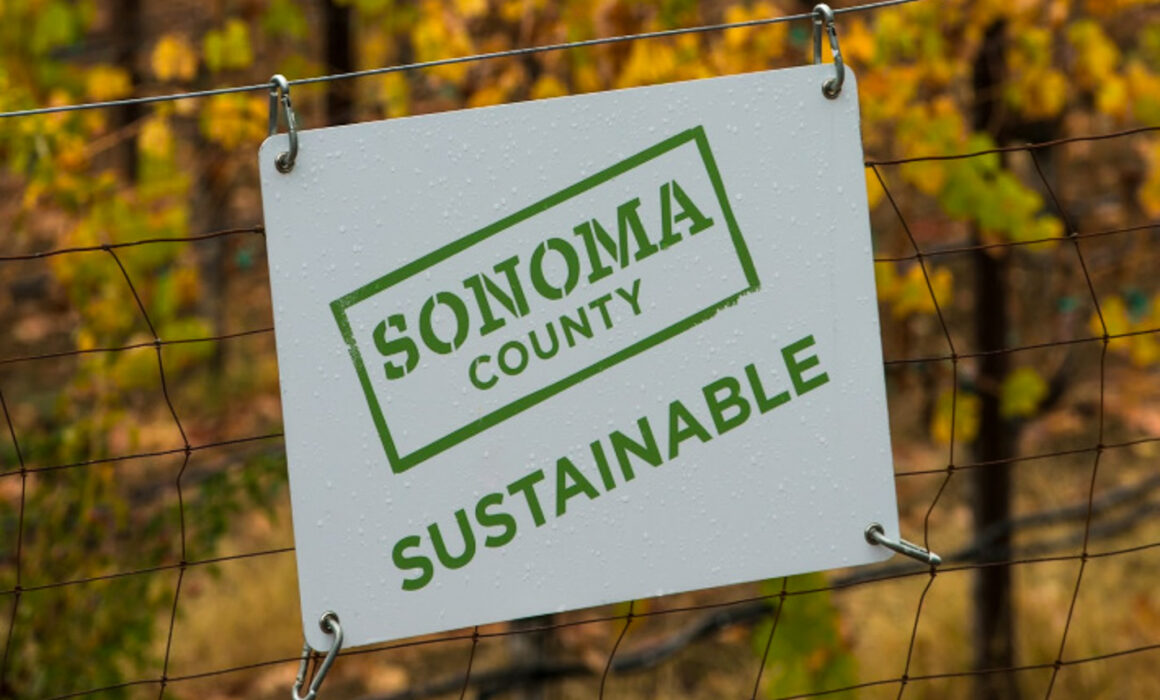Sustainability is Sonoma County’s Calling Card
By Virginie Boone
When the Sonoma County Winegrowers committed to becoming the most sustainable winegrowing region in the world in 2014, the focus was local, to make Sonoma County a better place to live, work and grow grapes, to make winegrowing a viable endeavor for generations to come.
While it took five years to get 99% of the acreage third-party certified sustainable, it didn’t take long for the world to take notice of Sonoma County’s bold goal and to want to align on common ground. Sustainability had become Sonoma County’s calling card.
That calling card has brought forth a wide array of partnerships from both likely and unlikely corners.
GuildSomm and the Sonoma County Winegrowers have partnered to host Masterclasses in key wine markets across the country, pouring Sonoma County wines for wine buyers and restauranteurs. That partnership also produces Top Somm, a competition where the 15 top sommeliers from around North America come to Sonoma County for a three-day immersion experience in the vineyards.
Another three-day immersion takes place in the form of the Healdsburg Wine & Food Experience in May. Co-founded by the Sonoma County Winegrowers, it is now in its third year. Part of the event’s mission is to support and elevate Sonoma County’s rich agricultural heritage and its farmers and vineyard employees, very much through the lens of sustainability.
Further afield, Areni Global is an independent think tank for fine wine that looks to solve the pressing issues of the day affecting wine, including environmental and societal changes.
Last summer, Areni came to Sonoma County for part of its Insight Series, “Securing the Future of Fine Wine,” partnering with Sonoma County Winegrowers and the Wine Institute, bringing 50 thought leaders from 12 different countries to the region for vineyard immersions and work sessions.
Another international partner that came calling is FIVS, which works for the overall sustainability of the global beverage industry, including wine.
Short for Federation Internationale des Industries et du Commerce en Gros des Vins, Spiritueaux, Eaux-de-vie et Liqueurs, FIVS gathers information to engage in such policy and technical issues as advertising restrictions, restrictive trade measures and allergen labeling requirements and serves as a networking platform for industry members, government officials and academic experts to collaborate on industry initiatives. Sonoma County Winegrowers President Karissa Kruse has spoken on Sonoma County’s sustainability efforts at their global meetings on several occasions including the recent FIVS meetings in London.
Certainly, when Ford Pro came calling, looking to collaborate with Sonoma County Winegrowers to launch a pilot program with three Sonoma County farms and demonstrate how electric vehicles could have a positive impact on the agriculture industry, sustainability was at its core.
“Ford Pro and the Sonoma County Winegrowers are driven by many of the same tenets,” Ford Pro global chief marketing officer Wanda Young said at the time, “to accelerate productivity while operating responsibly.”
A longstanding partnership between Sonoma County and Landry’s dining establishments around the country is equally in sync, with the restaurant group committed to sustainability and environmentally friendly practices across its many restaurant, hospitality and entertainment venues around the world. This shared focus has led to a fruitful partnership where Sonoma County wines are featured because of how they represent sustainability.
This follows through with Sonoma County Winegrowers more recent partnership with the NBA’s Houston Rockets in the Toyota Center’s lounges, restaurants and other locations during Rockets games and other events during the year. The Houston Rockets have the same owner as Landry’s, making this a logical extension of its interest in Sonoma County’s sustainability impact.
Agrology and Wilbur-Ellis are two other collaborators more centered within the agricultural sphere that align with Sonoma County’s sustainability ethos. Agrology works to sequester carbon by tracking soil carbon in real-time, while Wilbur-Ellis, one of the largest family-owned companies in the world, is a leader in sustainable agribusiness.
Each of these partnerships and collaborations have chosen Sonoma County because of its commitment to sustainability and ability to communicate the importance of sustainable practices to a wide population of consumers.
Ten years after setting that initial goal to become the most sustainable winegrowing region in the world, Sonoma County is also now one of the most desirable names to be associated with when it comes to sustainability. There is only more to come.


